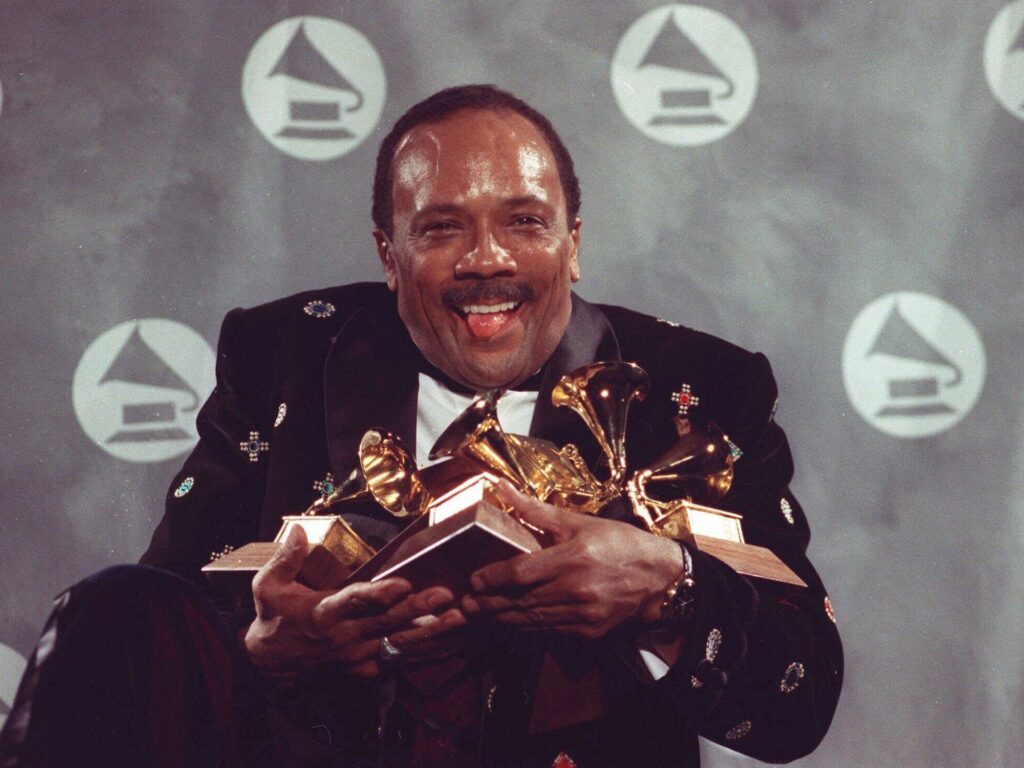Quincy Jones, the multi-talented music titan whose huge legacy ranged from producing Michael Jackson’s historic Thriller album to writing prize-winning movie and tv scores and collaborating with Frank Sinatra, Ray Charles and lots of of different recording artists, has died at 91.
Jones’s publicist, Arnold Robinson, mentioned he died Sunday night time at his dwelling within the Bel Air neighbourhood of Los Angeles in the USA, surrounded by his household.
“Tonight, with full however damaged hearts, we should share the information of our father and brother Quincy Jones’ passing,” the household mentioned in a press release. “And though that is an unbelievable loss for our household, we have a good time the nice life that he lived and know there’ll by no means be one other like him.”
Jones rose from operating with gangs on the South Facet of Chicago to the very heights of present enterprise, changing into one of many first Black executives to thrive in Hollywood and amassing a unprecedented musical catalogue that features among the richest moments of American rhythm and tune. For years, it was unlikely to discover a music lover who didn’t personal at the least one file along with his title on it, or a frontrunner within the leisure trade and past who didn’t have some connection to him.
Jones stored firm with presidents and international leaders, film stars and musicians, philanthropists and enterprise leaders. He toured with Depend Basie and Lionel Hampton, organized information for Frank Sinatra and Ella Fitzgerald, composed the soundtracks for Roots and Within the Warmth of the Evening, organised US President Invoice Clinton’s first inaugural celebration and oversaw the all-star recording of We Are the World, the 1985 charity file for famine reduction in Africa.
In a profession that started when information have been nonetheless performed on vinyl at 78 rpm, high honours seemingly go to his productions with Jackson. Off the Wall, Thriller and Dangerous have been albums near-universal of their model and enchantment. Jones’s versatility and creativeness helped set off the explosive expertise of Jackson as he reworked from little one star to the “King of Pop”.

The checklist of Jones’s honours and awards fills 18 pages in his 2001 autobiography Q, together with 27 Grammys on the time (now 28), an honorary Academy Award (now two) and an Emmy for Roots. He additionally acquired France’s Legion d’Honneur, the Rudolph Valentino Award from the Republic of Italy and a Kennedy Middle tribute for his contributions to American tradition.
Jones was the topic of a 1990 documentary, Pay attention Up: The Lives of Quincy Jones and a 2018 movie by daughter Rashida Jones.
Born in Chicago in 1933, Jones would cite the hymns his mom sang round the home as the primary music he may keep in mind. However he appeared again sadly on his childhood, as soon as telling Oprah Winfrey: “There are two sorts of individuals: those that have nurturing dad and mom or caretakers, and those that don’t. Nothing’s in between.”
Jones’s mom suffered from emotional issues and was finally institutionalised, a loss that made the world appear “mindless” for the younger son, who spent a lot of his time in Chicago on the streets with gangs, stealing and preventing.
“They nailed my hand to a fence with a switchblade, man,” he instructed the Related Press in 2018, displaying a scar from his childhood.

Music saved him. As a boy, he realized {that a} Chicago neighbour owned a piano and he quickly performed it continually himself.
His father moved to Washington state when Jones was 10 and his world modified at a neighborhood recreation centre. “I went up there, paused, stared, after which tinkled on it for a second,” he wrote in his autobiography.
“That’s the place I started to search out peace. I used to be 11. I knew this was it for me. Ceaselessly.”

As a music govt, he overcame racial boundaries by changing into a vice chairman at Mercury Data within the early Nineteen Sixties. In 1971, he grew to become the primary Black musical director for the Academy Awards ceremony. The primary film he produced, The Shade Purple, acquired 11 Oscar nominations in 1986, however no wins.
In a partnership with Time Warner, he created Quincy Jones Leisure, which included the pop-culture journal Vibe and Qwest Broadcasting. The corporate was bought for $270m in 1999.
“My philosophy as a businessman has at all times come from the identical roots as my private credo: take proficient folks on their very own phrases and deal with them pretty and with respect, regardless of who they’re or the place they arrive from,” Jones wrote in his autobiography.
